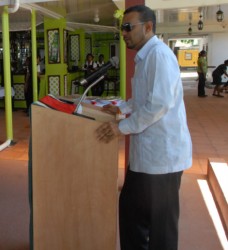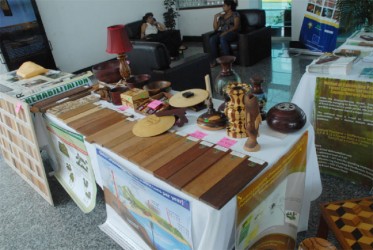Guyana has commenced negotiations with the European Union (EU) that will lead to the formulation of a Forestry Law Governance and Trade (FLEGT) Action Plan to effectively bring the governance regime of the country’s forest resources under international scrutiny and enhance its environmental bona fides.
Natural Resources and Environment Minister Robert Persaud told Monday’s start of the 28th Session of the Latin American and Caribbean Forestry Commission (LACFC) that government had commenced negotiations with the EU on the formulation of a FLEGT Voluntary Partnership Agreement (VPA) “following a thorough

national process of stakeholder engagement.” Persaud said Guyana had developed “a detailed roadmap with the assistance of local and international stakeholders” for the formulation of the agreement and had set what he described as “an ambitious timeline of September” for the implementation of the agreement.
A critical element of the FLEGT Action Plan is a voluntary scheme that seeks to ensure that only legally harvested timber is imported into the EU from countries agreeing to take part in the scheme. The internal EU legal framework for the scheme is a regulation adopted in December 2005, and a subsequent 2008 implementing regulation that allows for EU member states to control the entry of timber into their respective countries from countries that are party to bilateral FLEGT VPA’s with the EU. Once agreed, the VPAs carry with them commitments by signatory countries to a mutual Action Plan to suppress trade in illegal timber through a licence scheme that verifies the legality of timber exported to the EU. The agreements also promote more effective enforcement of forest law and embrace an inclusive approach to forest management, involving civil society and the private sector.
Negotiations leading to the conclusion of a FLEGT VPA between Guyana and the EU will involve the European Commission which has been given a mandate from the EU’s Council of Ministers of to conduct negotiations in view of concluding such agreements.
Guyana is currently hosting the hemispheric forestry forum at a juncture that coincides with a global focus on environment-linked responsible management of global forestry resources. The deliberations have addressed issues of good governance, sustainable forestry, illegal logging and sustainable management of forest resources.

At Monday’s opening session, Persaud told delegates that Guyana was seeking more effective ways of managing the country’s natural resources, one such initiative being the creation under the administration of President Donald Ramotar of a Natural Resources and Environment Ministry. Additionally, Persaud disclosed that Guyana had revised key pieces of natural resources legislation including the 2009 Forests Act and was at the point of “finalising the development of a Strategic Plan for the natural resources sector.”
Guyana’s Low Carbon Development Strategy (LCDS) at the heart of which is the responsible management of the country’s forest resources has positioned the country as one of the more prominent advocates of an environmentally responsible forest harvesting programme. At last Monday’s opening session Persaud advocated that the key deliberations of the forum include “the role of forests as a climate change mitigation solution, tapping into the potential of forest as a provider of multiple benefits; and examination of new programmes and initiatives that are emerging and allow[ing] for a space to discuss how, as a region, we can confront these in a manner that prevent the generation of divergences in the future, within our region.





